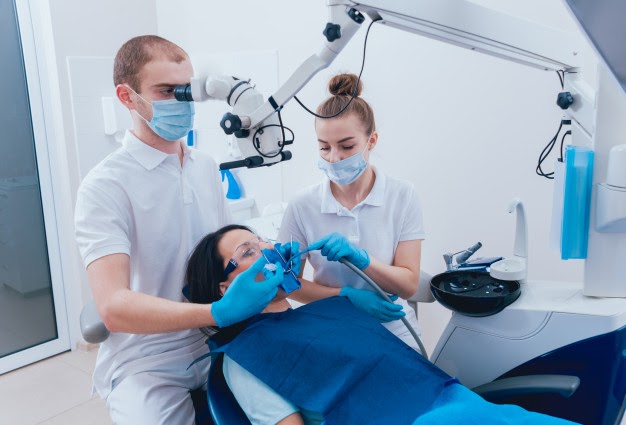What is a Root Canal?
Root canal treatment simply called a root canal, is an endodontic procedure to treat an infected, inflamed, or dead pulp of a tooth. The procedure can treat problems from an earlier filling, deep cavities, and genetically or accidentally cracked teeth.
Causes of Root Canal
You may require root canal treatment for the following causes:
- Toothache
- Tender or swollen adjacent gums
- Severe pain while chewing or biting on foods
- A chipped or cracked tooth
- A pimple on the gum that doesn’t resolve
- Dental sensitivity to hot or cold drinks or foods even when they have been removed and that slowly subsides or lasts very long
The procedure of Root Canal
The patient receives local anesthesia before treatment starts. A rubber dam is put in the mouth for isolating the affected tooth and for protecting other parts of the patient’s mouth during the procedure.
Initially, an access hole is drilled in the tooth. The hole is made on the chewing surface of a posterior tooth and the lingual surface of a front tooth. Through the hole, the pulp substances are eliminated using a small tool. Then an antimicrobial solution is used to irrigate the interior of the tooth to remove the infection. With tiny tools, the pulp chamber and canals are widened and shaped to allow a thorough tooth cleaning. Then the chamber and canals are filled with a warm soft rubber (gutta percha) and a sealer. Then the access hole is shut using a dental restorative substance like composite resin, or a temporary filling.
The bite (occlusion) is checked and adjusted so that no heavy biting happens on the treated tooth from the opposite one. Unlike anterior teeth, posterior teeth are more vulnerable to fracture from chewing, and hence, treated with dental crowns. The crown is usually placed during another appointment.
Pain after Root Canal
Sometimes, you may have an infected tooth that pains a lot and requires root canal treatment. Hence, you may feel pain to some extent before treatment starts, not during the procedure. Since the treatment is carried out under local anesthesia, any pain felt is minimized. During the cleaning process, some pressure may be felt. But it doesn’t generally pain during the main procedure.
There used to be severe pain after the root canal in the past. Hence, at times, people avoided such treatments. However, with advanced pain management, several ways are available to ease pain and comfort the patient during treatment. Slight pain is generally a temporary side effect while getting used to a new fixed dental crown.
How long should pain remain after root canal treatment?
Pain after a root canal lasts how long, depends on the severity of your dental condition. Besides, root canal treatment doesn’t give long-lasting pain. It rather aims to manage pain associated with dental fractures or decay. As the local anesthesia wears off after treatment, there may be sensitivity and mild pain. The pain is linked with the cleaning procedure. During this process, the dentist creates a tiny opening in your dental crown to clean out the affected pulp inside the tooth. So, it’s normal to feel mild pain after treatment. But if root canal pain remains after 3 days, you should visit the dentist for a follow-up. If you have pain after the first sitting of a root canal, it may indicate that you need another cleaning session. This is not unusual. Most patients require 1-2 sessions to have a successful root canal.
| Also Read: You Might Need Care After a Root Canal Treatment |
How to relieve pain after root canal treatment?
As the pain after root canal treatment is mostly mild, you may only require over-the-counter (OTC) drugs for relief. These usually include ibuprofen (Motrin IB, Advil) and acetaminophen (Tylenol). You must discuss with the doctor these medications before taking them to ensure no reactions to any prescriptions or supplements being already taken. If you don’t take OTC medications, prescription-strength narcotic pain relievers or ibuprofen may be recommended. They are taken temporarily.
There may be tooth pain after the root canal when biting. So, avoid eating too crunchy foods. You may also feel pain while chewing after the root canal. In that case, avoid hard foods and try liquid foods for a few days after treatment. The same can also relieve any jaw pain after the root canal.
You must also maintain oral hygiene and quit smoking to look after your teeth.
Sometimes, stress-relieving methods can help to manage pain. Yoga and meditation, for instance, can take the focus off the dental pain.
Smiles Oracles are the best dental clinic in Greater Kailash. The clinic houses top endodontic specialists who excel in root canal treatment in Greater Kailash. Due to their proficiency, they ensure that there is minimal pain during and after root canal procedure and your dental concerns are effectively treated.

